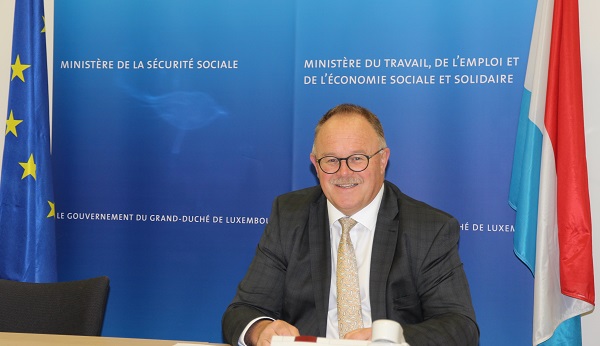 Romain Schneider, Minister of Social Security;
Credit: MSS
Romain Schneider, Minister of Social Security;
Credit: MSS
On Thursday, Luxembourg's Minister of Social Security, Romain Schneider, and the President of the Pension Fund (Fonds de compensation commun au régime général de pension, FDC), Fernand Lepage, presented to the members of the Parliamentary Labour Committee the FDC investment policy.
More specifically, they presented the measures undertaken to make investments more sustainable in environmental and societal matters. These exchanges took place within the framework of a motion submitted by Déi Lénk (the Left political party).
Minister Romain Schneider first recalled that the legal mission of the FDC is to manage the reserve in the general pension scheme in complete safety and to derive an effective return from it while diversifying the risks. The FDC is required to ensure, in accordance with the law, a broadly diversified portfolio with return and risk characteristics in order to contribute to the sustainability of the general pension scheme. It is within this well-defined framework that the FDC exercises its mission of managing the reserve, which today amounts to around €22 billion.
The minister stated that, as an institutional investor, the FDC is aware of its ecological, social and good governance responsibilities and this is taken into account when determining its investment strategy and its investment decisions. He added that the current responsible investor policy ensures that the implementation of sustainable development processes and the management of climate risks are an integral part of the FDC's investment process.
In recent years, the Minister of Social Security and the board of directors of the FDC (made up of representatives of the government and the social partners) have made several efforts to implement a more sustainable and socially responsible investment policy. The FDC strategy was modified in 2017 to integrate various measures to implement this desire to make socially more responsible and environmentally sustainable investments. These measures aim, among other things, to take account of Luxembourg's commitments under the Paris Agreement and the seventeen sustainable development goals of the United Nations' 2030 Agenda.
Examples cited were the creation of two new compartments specifically dedicated to generating a positive impact on the environmental level (the first is exclusively composed of green bonds (green) and the second invests purely in listed companies which intend to generate a social or environmental impact through specific projects in addition to a financial return) and the obligation for each bidder responding to calls for tenders to implement an investment strategy based on Environmental, Social, and Governance (ESG) criteria.
Minister Romain Schneider clarified that it is thanks to these efforts that the FDC has obtained to date nine certifications by the LuxFLAG certification agency and a large part of the FDC's assets is therefore currently certified "ESG” or “Environment” by LuxFLAG.
The FDC also reportedly ensures that its investments through its SICAV comply with international conventions and standards as ratified in the ten principles of the United Nations Global Compact covering human rights, the environment, international labour standards and fighting corruption or involved in activities related to controversial weapons.
Efforts are also focussed on FDC investments in real estate. Indeed, the FDC is not only a shareholder in the National Society for Low-Cost Housing (SNHBM), but has also undertaken the process of developing synergies with other public actors active in the field of low cost rental. A recent example was the future urban planning project for the land housing the "Social Insurance Office" building as part of the specific Hollerich district development plan in Luxembourg City.
Finally, in line with the efforts already made, a sustainability report is being prepared which includes three components: the carbon footprint, the energy trajectory resulting from COP 21 and exposure to the financial risks linked to climate change. This report is intended to become a working tool for the FDC in order to possibly adapt certain compartments of its investor strategy for the years to come.








